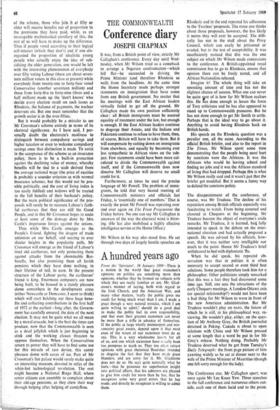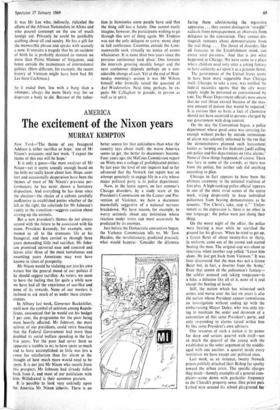Conference diary
THE COMMONWEALTH JOSEPH CHAPMAN
It was, from a British point of view, strictly Mr Callaghan's conference. Every day until Wed- nesday, when Mr Wilson tried as a comeback to arrange a Nigerian confrontation—which fell flat—he succeeded in driving the Prime Minister (and therefore Rhodesia as well) from the headlines. At the same time the Home Secretary made perhaps stronger statements on immigration than have come from any British government. No matter that his meetings with the East African leaders virtually failed to get off the ground. Mr Callaghan made his own position sufficiently clear: all British immigrants must be assured equality of treatment under the law, but enough is enough. If the East African leaders continue to disgorge their Asians, and the Indians and Pakistanis continue to refuse to have them, then, of course, Britain will have to take them. But it will compensate by cutting down on immigrants from elsewhere, and equally by becoming ever less sympathetic to African views on the sub- ject. Few statements could have been more cal- culated to divide the Commonwealth against itself, and if the Commonwealth does now dissolve Mr Callaghan will deserve no small credit for it.
Furthermore, at times he used the precise language of Mr Powell. The problem of immi- grants, he told that very heated meeting of Commonwealth ministers and officials last Friday, is 'essentially one of numbers.' That is exactly the point Mr Powell was repeating over and over again on The Frost Programme the Friday before. No one can say Mr Callaghan is unaware of the way the electoral wind is blow- ing. (He has also mobilised a highly effective intelligence service at the Home Office.) Mr Wilson in his way also stood firm. He sat through two days of largely hostile speeches on Rhodesia and in the end repeated his adherence to the 'Fearless' proposals. The more one thinks about those proposals, however, the less likely it seems they will ever be accepted. The diffi- culty lies not in the stuff about the Privy Council, which can easily be jettisoned or evaded, but in the test of acceptability. It was insufficiently noticed that this was the one subject on which Mr Wilson made concessions to the conference. A British-appointed royal commission has to go to Rhodesia, ensure that opinion there can be freely tested, and all African Nationalists released.
Imagine it! The whole thing will take an unending amount of time and has not the slightest chance of success. What one can never be quite sire of is how far Mr Wilson realises- this. He nas done enough to lessen the force of Tory criticisms and he has also appeared to stand up to Commonwealth pressures. But he has not done enough to get Mr Smith to settle. Perhaps that is the ideal way to go about it. Anything to avoid having Rhodesia back on British hands.
His speech on the Rhodesia question was a peculiar one, all the same. According to the official British briefer, and also to the report in The Times, Mr Wilson spent some time demonstrating that the people being most hurt by sanctions were the Africans. It was the Africans who would be leaving school and finding no jobs and it was the African standard of living that had dropped. Perhaps this is what Mr Wilson really said and it wasn't just that the briefer got muddled. But it seems a funny way to defend the sanctions policy.
The disappointment of the conference, of course, was Mr Trudeau. The decline of his reputation among British officials especially was fascinating to watch. From being cosseted and closeted at Chequers at the beginning, Mr Trudeau became the object of everyone's snide remarks. Mr Trudeau, it is learned, hack fully intended to speak in the debate on the inter- national situation and had actually prepared a speech. He was advised by his officials, how- ever, that it was neither very intelligible nor much to the point. Hence Mr Trudeau's brief withdrawal to bed with diplomatic 'flu.
When he did speak, his repeated ob- servation was that in politics it is often necessary to accept second or even third best solutions. Some people therefore took him for a philosopher. Other politicians simply remarked that this was a fact they had discovered some time ago. Still, one sees the attractions of the early Chequers meetings. A London-Ottawa axis (or special relationship?) would not have been a bad thing for Mr Wilson to wave in front of the new American administration. But Mr Trudeau wouldn't play on NATO, the future of which he is still, in his philosophical way, re- viewing. He wouldn't play, either, on the ques- tion of Mr Anthony Grey, the British journalist detained in Peking. Canada is about to open relations with China and Mr -Wilson pressed at some length that a word be put in for Mr Grey's release. Nothing doing. Probably Mr Trudeau deserved what he got from Tuesday's Daily Telegraph: the front page picture of him yawning widely as he sat at dinner next to the wife of the Prime Minister of Mauritius (though one felt sorry enough for the lady).
The Conference star, Mr Callaghan apart, was once again Mr Lee Kuan Yew. Three speeches to the full conference and numerous others out- side, each one of them lucid and to the point. It was Mr Lee who, indirectly, ridiculed the efforts of the African Nationalists in Africa and who poured contempt on the use of much foreign aid. Privately he could be justifiably scathing about all and sundry. He has a gift for the memorable phrase and speaks with scarcely a note. It remains a tragedy that by an accident of birth he is probably destined to remain no_ more than Prime Minister of Singapore, and hence outside the mainstream of international politics. (How different, for example, the recent history of Vietnam might have been had Mr Lee been Cochinese.) So it ended then, less with a bang than a whimper, always the more likely way for so disparate a body to die. Because of the reduc-
tion in histrionics some people have said that the thing still has a future. One cannot easily imagine, however, the participants wishing to go through this sort of thing again. Mr Trude,au was not the only delegate to yawn; many slept in full conference. Countries outside the Com- monwealth took virtually no notice of events whatsoever. It is more than two years since the previous conference took place. One foresees the intervals growing steadily longer and the next conference depends perhaps on a con- siderable change of cast. Yet at the end of Wed- nesday morning's session it was Mr Wilson himself who formally raised the question of Au! Wiedersehen. Next time, perhaps, he ex- pects Mr Callaghan to preside, in person as well as in spirit.



































 Previous page
Previous page